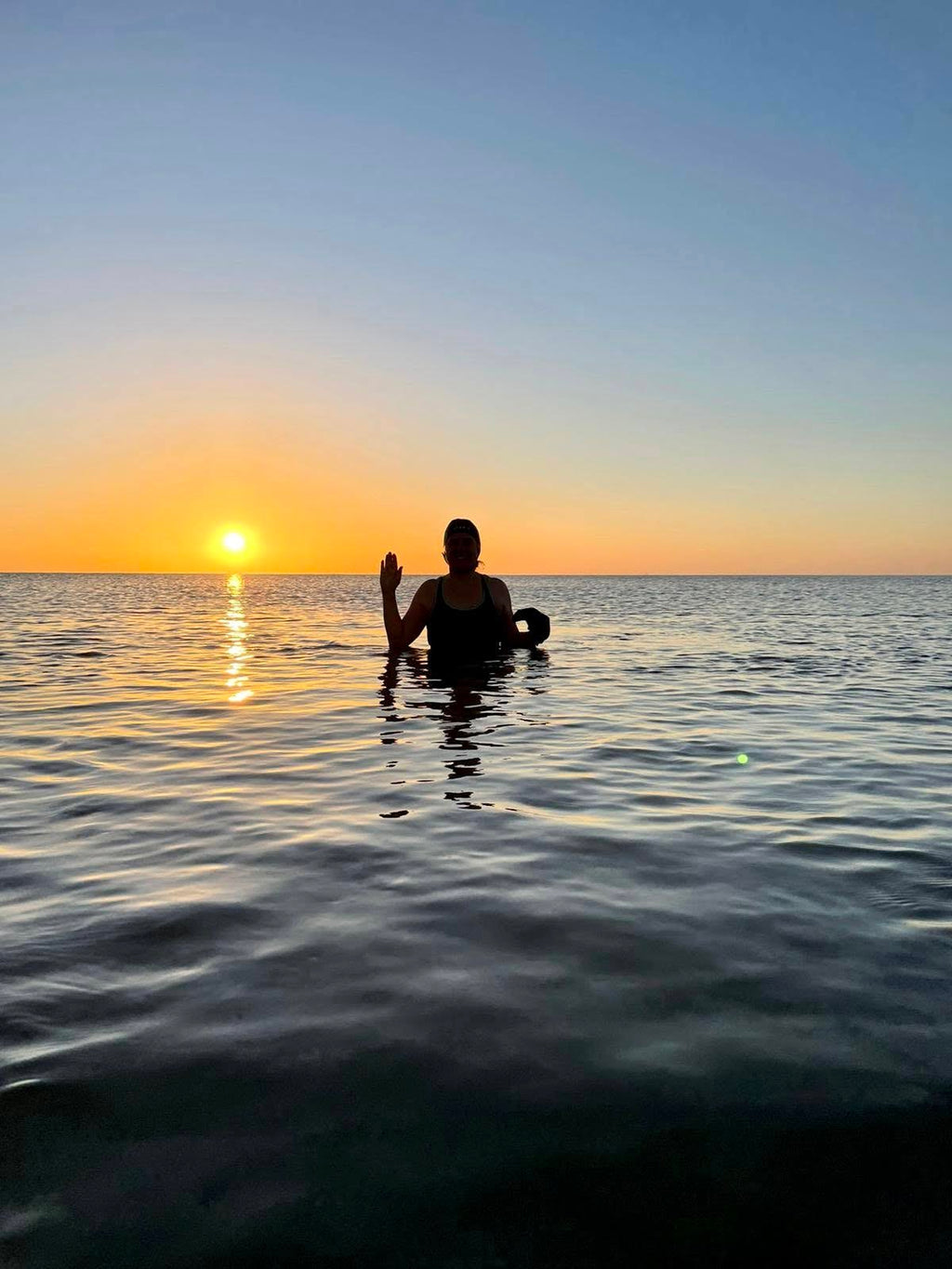back to all posts
Why I Swim - Sara Solnick

I love the water, I always have, though the love affair has changed over time. Now I live near the sea, in the Suffolk village of Walberswick, and going to swim at or near sunrise each day has become my most precious daily moment.
It was not always like that. Outdoor swimming, anywhere remotely wild, was not always a sought-after treasure. As a child I spent my summers cavorting in an outdoor swimming pool and learning to appreciate the freedom that it afforded along with suffering sibling dunkings, raw-toed abrasions, too-much-air-swallowed excruciating stomach cramps, and the staying-in-too-long bone-ache cold. I learnt to be braver than I naturally am; to do handstands and backwards dives and hold my breath underwater for so long I thought I’d burst. For a sheltered and quiet timid child, the water represented limitless adventure and a sense of liberation; the place where so much unparalleled fun was had.
I spent so much time in the pool that I became a confident swimmer, and school swimming offered competitive challenges that this otherwise non-athlete loved. My best friend also swam well and we raced and trained endlessly and we thrived on that. The water had become my natural element, making me feel graceful, a place where I could move seamlessly, more like seal or dolphin.
I rarely swam in the sea. My mother was afraid of water and hated swimming, so we didn’t often go there; the compensation was having an outdoor pool, and I didn’t feel a lack.
The call of the tide though has always been strong and I can’t remember a time when I didn’t want to live near open water, even when I felt no desire to get in it. Recently I went down to the sea with my daughter one night when the full moon was up, and she watched as I swam out alone. I hesitated, being apprehensive because I couldn’t really tell how big the waves were or whether it was safe to get in, and I muttered something about being a bit of a wimp. My daughter laughed and said she no longer recognises this woman who will go out in the cold at night and in winter to swim in the sea on her own. This is not the mother who brought her up. It seems that I’ve changed, and more fully found my selkie self.
For twenty years I taught the Alexander Technique with its emphasis on how we do what we do, on attending, on taking time, on moving with ease and an economy of effort. It can be applied to all manner of particular activities, and my special interest was in swimming. I spent a long time re-learning my way strokes to unshackle myself from my competitive and damaging habits, particularly around breathing., and I spent years sharing what I learnt with others. But I was always in a pool, preferably on my own, doing a kind of moving meditation in a clear and safe space with no surprises.

Alongside this gentle swimming practice, over the years, the lure of the sea was gradually reaching out and under my skin. There were stand-out exceptional swims in exotic and unfamiliar places: Umhlanga rocks in South Africa where the stone-wash rough and tumble in the tide was so strong, so scary, so wild; the exquisite aquamarine still still blue of the little gem that is Lake Tenno, up above Garda in Italy, where the water tastes like Evian and is vertiginously deep; tidal pools and sandy beaches on the west Wales coast; Balnakeil Bay.
Then my living-by-the-sea dream came true and we moved the east coast. Here, a small group of sea swimmers went in all year. At first I would put a toe in in fair-weather while travelling far to find a pool to continue my meditative slow swimming somewhere inland. But the balance started to change and I began to sea swim more often and later into the winter, and then eventually Covid came and shut down the pool completely.
The blossoming of a new kind of sea-love started during a time of disintegration and grief. I was persuaded by some of the soul-searching memoirs I read that perhaps cold-water swimming might help me develop new resilience, recover myself, find my mojo. It really did.
But even now, at 61, the reason I swim is changing: my morning moments mostly end up in the sea, but I am drawn to the dawn, to the silence of sunrise, to the infinite variety that presents itself at this near-featureless beach where I swim. Sometimes I sit alone for a long while before sunrise and watch the sky lighten, the birds fly, and the changing aspects of the face of the sea. Sometimes swimming doesn’t happen if the waves look dive-in-at-your-peril dangerous, and they sometimes do. I love the way the moods of the sea might reflect or rub up against my own. The atmosphere at the beach feels so animated, alive. I yearn to see the sun; sometimes it has duvet-days and hides behind banks of thick cloud. Increasingly too, the full moon lures me into her silvery skirts across the sea. Even when cold, after that curglaff chill slap, there’s a warmth to her close wet embrace. 
When I’m in the sea I feel fully of the world, held together in our floating lifting and falling dance, vitally present. The dissociation that stress and trauma like to delight in, the incongruence between self and world, dissolves and I know I am safely home and held in this so large and co-creative embrace that is awesome in its power, sometimes dangerous to be around, but never personal in its wildness, always deserving of attention and respect.
Sometimes I swim, sometimes I dip and bob or float, sometimes I stand and watch. Why do I swim? Because it is this that has led me to realise my deep connection and integration with the elemental world of which I am a part and in which I, and swimming itself, no longer really matter.

----------------------------
Our Why I Swim project aims to give voice to our untold swim stories and strengthen our fantastic community. If you would like to share your story, drop us an email at info@swimferal.co.uk
----------------------------
If you are new to outdoor swimming and feel inspired to give it a go, please ensure you do so safely.
Firstly, have a read of our tips for winter swimming here and familiarise yourself with what's useful to have in your wild swim kit.
We would strongly advise trying out your first swim with an experienced cold water swimmer until you are completely confident of your own abilities.
The Outdoor Swimming Society has a great list of local swimming groups which is well worth checking out and a quick search on Facebook should provide results.
And if you have any questions, pop a post in the Swim Feral Facebook page and our fantastic community of swimmers will be sure to help.
Happy swimming xx
Mailing List
Keep informed of future Swim Feral projects and products. We promise we will only contact you when we have something we are proud to share.


